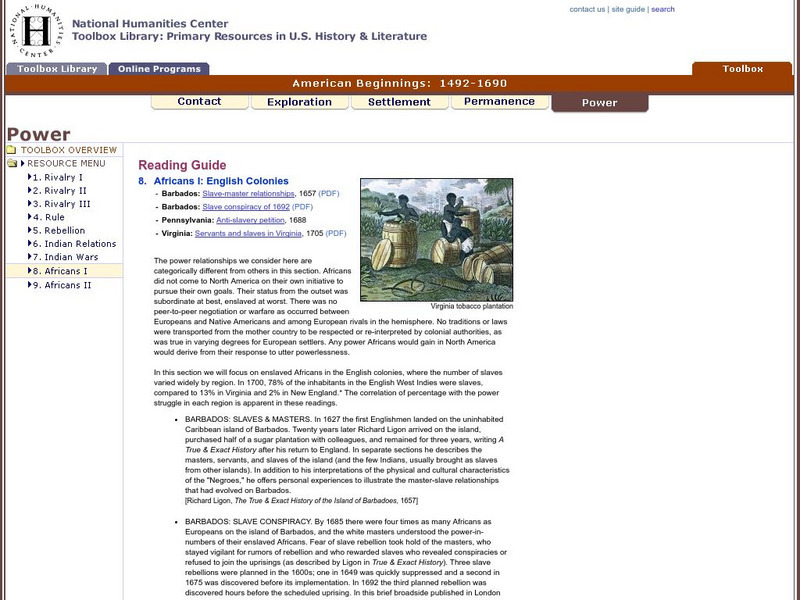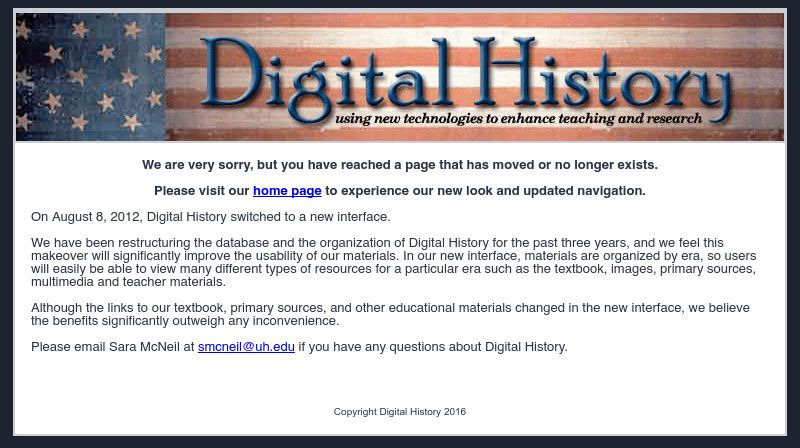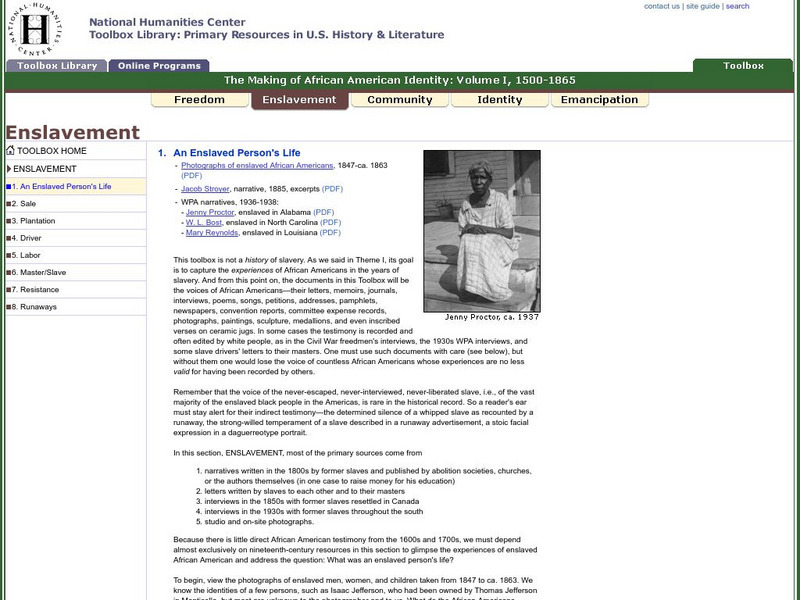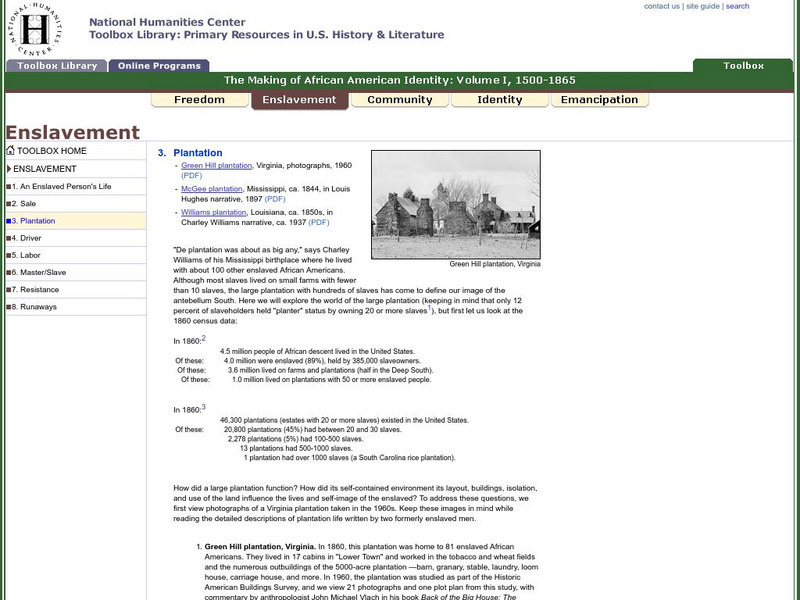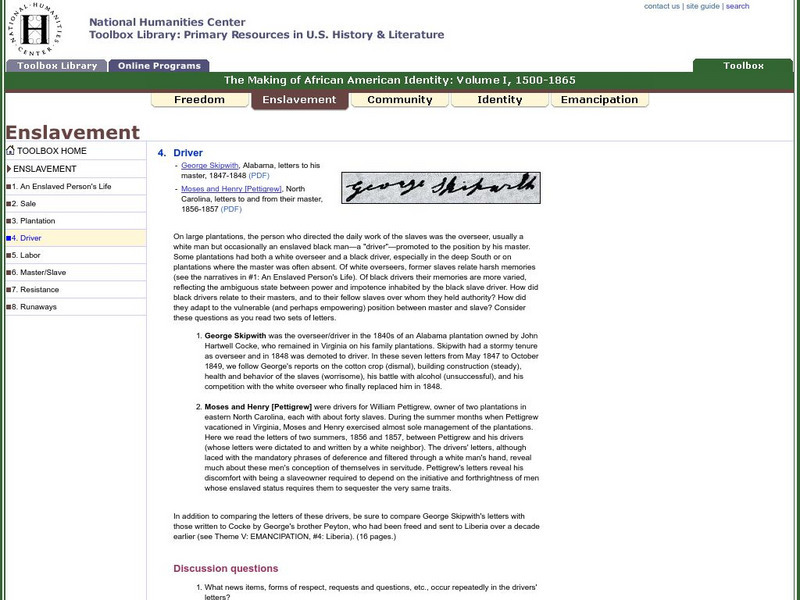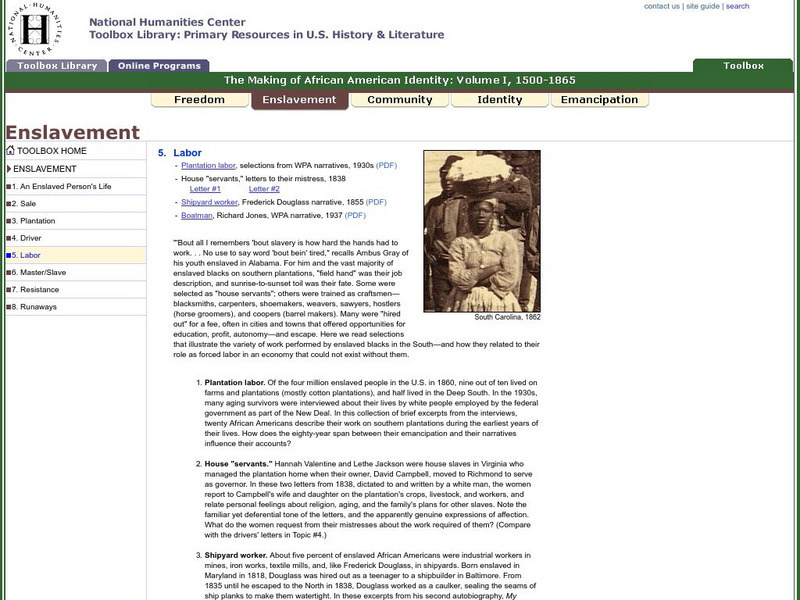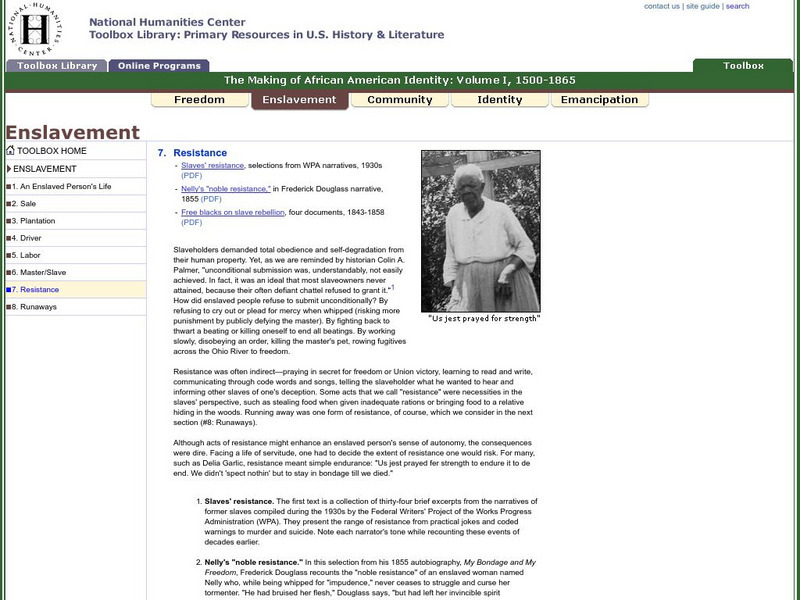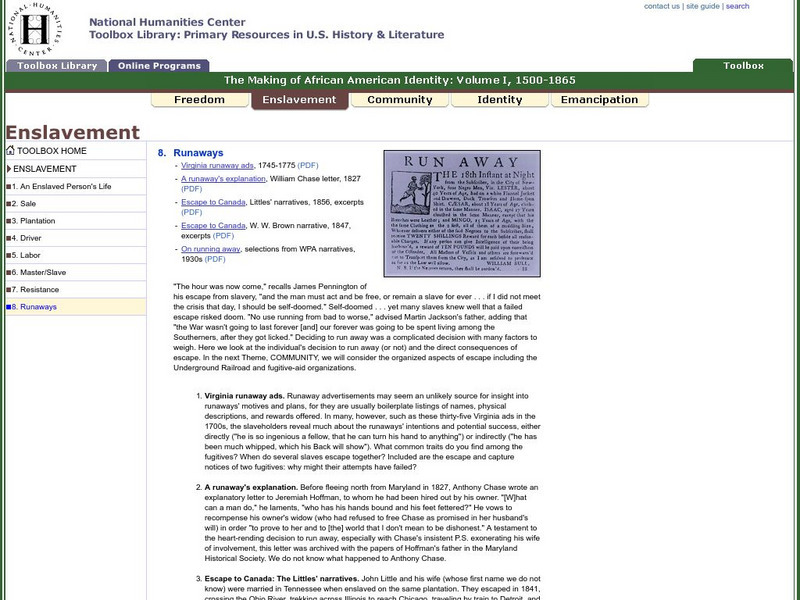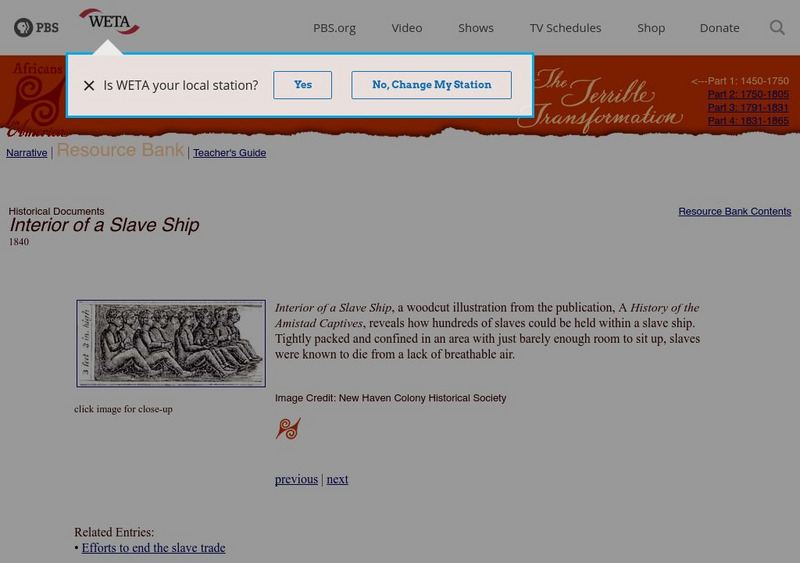National Humanities Center
National Humanities Center: Toolbox Library: Slave, Making of African American Identity: V. 1
This resource provides nineteenth-century black narratives that address what it meant to be enslaved and how slaves' identity was formed and changed over time.
National Humanities Center
National Humanities Center: Toolbox Library: Community, Making of African American Identity: V. 1, 1500 1865
Twenty nine primary sources-historical documents, literary texts, and visual images-that explore how enslaved individuals and families coped with, adjusted to, maintained communities within, and opposed the system of oppression.
Milwaukee College Prep
African American History: North and South, Slave and Free
An overview of the status and experiences of African Americans in the mid-1800s, both free and enslaved. Includes references to Frederick Douglass and his efforts to enlighten people about the discrimination and prejudice faced by...
National Humanities Center
National Humanities Center: Toolbox Library: Africans I, American Beginnings: 1492 1690
Four accounts of the complex power relationships between slaves and slave holders within English colonies in Barbados, Virginia and Pennsylvania, as well as documents about slave revolts and anti-slavery agitation.
PBS
Wnet: Thirteen: Slavery and the Making of America: Slave Religion
What religions did slaves bring from Africa to America? This PBS series site provides the historical overview of how early African Americans preserved African spiritual beliefs and practices while enslaved, converted to Christianity, and...
University of Richmond
Black Virginia: The Richmond Planet: 1894 1909
This curation, transcription, and interpretation of the Richmond Planet opens a window into fundamental issues of race, equity, justice, violence, and power that still stir the nation today. Thirteen formerly enslaved men formed the...
Other
Slavery by Another Name
Read this detailed narrative to learn about the mistreatment of African Americans long after people thought slavery had ended after the Civil War, but actually persisted into the twentieth century. Based on original documents, photos,...
PBS
Wnet: Thirteen: Slavery and the Making of America: Slave Responses to Enslavement
Using primary documents, oral histories, and other historical resources, learn how African Americans responded to enslavement prior to the Civil War. Includes interactive exercise.
Understanding Slavery Initiative
Understanding Slavery Initiative: Atlantic Crossing: Slave Forts Case Study
Find out about the disparity between the castle-like headquarters of slave forts and the deplorable conditions in which enslaved Africans lived while waiting to be transported by slave ship to the Americas.
National Humanities Center
National Humanities Center: Teacher Serve: Reconstruction and the Formerly Enslaved
What are the "big questions" of Reconstruction? Article provides an overview of the Reconstruction period when Americans debated rights and the nature of freedom and equality. It focuses on who was an American and how citizenship should...
PBS
Africans in America: Revolution: The Book of Negroes 1783
An interesting look at the compiling of the Book of Negroes, a register of those whom the British promised freedom during the course of the Revolutionary War. Find out why this was a component of the Treaty of Paris of 1783. From PBS.
Digital History
Digital History: Slavery Takes Root in Colonial Virginia
Read about how the decrease in the availability of indentured servants led to a vast increase in the importation of African slaves into the southern colonies. Bacon's Rebellion even had an effect on the replacement of indentured servants...
National Humanities Center
National Humanities Center: Toolbox Library: Enslavement, Making of African American Identity: V. 1, 1500 1865
Twenty-eight primary sources-historical documents, literary texts, and visual images-that explore plantation life, the qualities and conditions of slavery, work, and resistance to oppression.
National Humanities Center
National Humanities Center: Toolbox Library: An Enslaved Person's Life, Making of African American Identity
Various photographs of slaves from the pre-Civil War era, an autobiographical narrative of slavery, and three accounts recorded in the 1930s of the lives and conditions of former slaves are included in this large set of information...
Khan Academy
Khan Academy: Us History: 1844 1877: The Slave Economy
The South relied on slavery heavily for economic prosperity and used wealth as a way to justify enslavement practices.
National Humanities Center
National Humanities Center: Toolbox Library: Plantation, Making of African American Identity: V. 1
Numerous photographs of a Virginia plantation (taken in 1960), an autobiographical account of life on a Mississippi plantation from the nineteenth century, and an interview with a former slave about a Louisiana plantation recorded in 1937.
National Humanities Center
National Humanities Center: Toolbox Library: Driver, Making of African American Identity: V. 1
Unusual letters from black slave drivers, and in one case, letters in reply from the white slave owner, about crops, labor, and conditions on plantations in the mid-1850s.
National Humanities Center
National Humanities Center: Toolbox Library: Labor, Making of African American Identity: V. 1
Selections of original accounts either written during slavery or recorded in the 1930s that depict work as a plantation laborer, house servant, shipyard worker or boatman.
National Humanities Center
National Humanities Center: Toolbox Library: Resistance, Making of African American Identity: V. 1
Recollections of slave resistance by observers like Frederick Douglass, narratives of slave resistance collected during the Depression, and mid-nineteenth century accounts by former slaves calling for resistance to and overthrow of the...
National Humanities Center
National Humanities Center: Toolbox Library: Runaways, Making of African American Identity: V. 1
Several accounts by slaves of running away from bondage, written in the nineteenth century and also recorded in the 1930s, as well as newspaper advertisements seeking information about fugitive slaves in the eighteenth century.
Understanding Slavery Initiative
Understanding Slavery: The Campaign for Abolition: Campaigning Against Slavery
Find out about the first mass human rights movement in history when African monarchs, enslaved Africans, freed slaves, and millions of other ordinary people campaigned against the slave trade and fought for the abolition of slavery.
Other
African American Registry: The Moving Sacrifice of Margaret Garner
Read the tale of Margaret Garner, a runaway slave who took the life of her own child rather than see her returned to slavery. Click on Learn More to get the complete story.
PBS
Africans in America: Interior of a Slave Ship
This site describes how slaves were packed in the ships with barely enough room to sit or move, to maximize capacity.
University of North Carolina
Unc: History of the Negro Church: Electronic Edition
This website is quite unique, in that it compiles historical data in a segmented form of the birth and evolution of Black Christianity in America. Carter G. Woodson, one of the most respected names relative to the anthology of the Negro,...





